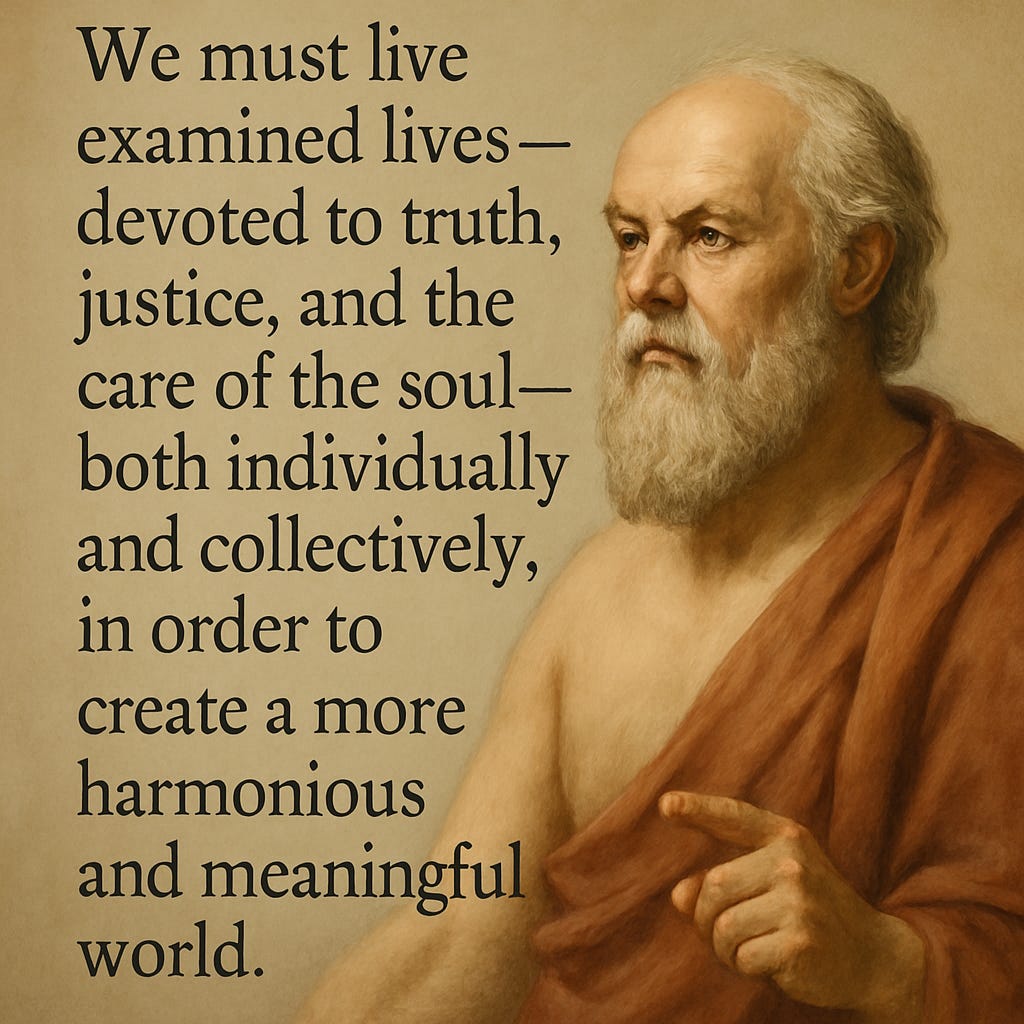A Life Unexamined...
“Socrates, the Qur’an, and the Sacred Duty of Self-Reflection in the Pursuit of Truth”
We must live examined lives—devoted to truth, justice, and the care of the soul—both individually and collectively, in order to create a more harmonious and meaningful world.
In today’s climate, those who dare to speak out in pursuit of truth and justice are often met with censorship, vilification, or worse. Their voices are manipulated or silenced to protect wealth, power, and privilege. Socrates’ enduring message—rooted in a higher divine mission—remains relevant: without self-reflection, inquiry, and moral courage, societies slide into complacency and moral decay.
Socrates recognised the danger of a democracy that no longer tolerates criticism. He warned that without continual questioning and philosophical inquiry, democracy risks becoming shallow, performative, and even oppressive. He lived out this warning himself—challenging his fellow Athenians to re-examine their values, to prioritise the soul over material gain, and to live in accordance with virtue.
His defence in The Apology culminated in one of the most famous declarations in the history of philosophy:
“The unexamined life is not worth living for human beings” (Apology 38a).
Far from being an enemy of the state, Socrates viewed himself as a gift from the god to the city. He compared himself to a gadfly and Athens to a sluggish horse, insisting that his role was to stir the city from moral slumber. Just as the gadfly irritates the horse into motion, Socrates’ method of persistent questioning was designed to awaken his fellow citizens to truth and virtue.
In Gorgias (521d–e), Socrates distinguishes between those who seek gratification and those who seek what is best. He claims to practice the “true political craft,” aiming not to please, but to heal—to improve the soul. He believed that he served not only the people of Athens but the will of the god itself.
Socrates’ entire mission, he insisted, was divinely inspired. He believed that the god had commanded him to examine his fellow citizens, to turn their attention away from wealth, fame, and bodily pleasures, and toward the cultivation of the soul (Apology 29d–30b). For him, virtue was the foundation of all goodness, and only through virtue could wealth and power be meaningful or just.
This unwavering commitment to moral and spiritual truth led many to question whether Socrates himself might have been one of the divinely inspired figures—a messenger of God to his people. He taught of a just, benevolent, and purposeful divine order, much to the dismay of a society that had grown comfortable in its materialism and traditional religious forms.
This interpretation aligns intriguingly with what the Qur’an teaches about divine messengers.
Qur’an, Surah Yunus, Chapter 10, Prophet Yunus, Verse 47 states:
“And for every nation is a messenger. So when their messenger comes, the matter will be judged between them in justice, and they will not be wronged.”
And Quran, Surah An-Nahl, Chapter 16, The Bee, Verse 36 proclaims:
“And We certainly sent into every nation a messenger, [saying], ‘Worship Allah and avoid Taghut.’”
These verses emphasise the universality of divine guidance—that God sent messengers to all peoples throughout history, to call them to truth and righteousness.
In this light, Socrates may well have been one of those voices of divine truth, calling his people to reject false gods and worldly illusions and to seek virtue, justice, and care for the soul.
As Allah warns in Quran, Surah al-Anfal, Chapter 8, The Spoils of War, Verse 22:
“Indeed, the worst of living creatures in the sight of Allah are the deaf and dumb who do not use reason.”
This verse underscores the spiritual peril of wilfully ignoring truth, of refusing to think, reflect, or question.
Today, we find ourselves in a world not unlike that of ancient Athens. We live in societies that proclaim freedom and democracy, yet stifle speech that challenges the establishment. Like Socrates, truth-seekers in our time are often branded as troublemakers or silenced altogether. But just as in his time, without the vital discomfort of inquiry and dissent, our communities risk moral stagnation.
We are thus reminded that Socrates’ legacy is not merely historical or philosophical—it is spiritual. His life and death call each of us to a sacred task: to reflect deeply, to speak truthfully, and to live with integrity. Only through this ongoing inner and outer struggle can we hope to build lives—and societies—worthy of the divine gift of reason.


